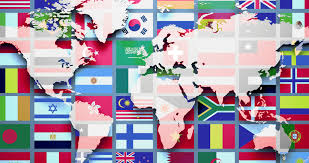The Importance of Embracing International Perspectives in Today’s World
In an increasingly interconnected global society, the concept of “international” has taken on new significance. The exchange of ideas, cultures, and experiences across borders has become essential for fostering understanding, cooperation, and progress on a worldwide scale.
Embracing international perspectives allows individuals and societies to broaden their horizons and challenge their preconceived notions. By engaging with diverse viewpoints from different countries and cultures, we gain a more nuanced understanding of the world around us.
One of the key benefits of embracing international perspectives is the opportunity for mutual learning and growth. When we interact with people from diverse backgrounds, we are exposed to new ways of thinking, problem-solving approaches, and cultural practices that can enrich our own lives and expand our worldview.
Furthermore, embracing international perspectives promotes empathy and tolerance. By recognizing the common humanity that unites us all, regardless of nationality or background, we can build bridges of understanding and compassion that transcend geographic boundaries.
From a business standpoint, embracing international perspectives is crucial for companies seeking to thrive in a globalized economy. Understanding cultural differences and adapting strategies to suit diverse markets can lead to increased competitiveness and success in the international marketplace.
In today’s rapidly changing world, where challenges such as climate change, economic inequality, and political instability transcend national borders, it is more important than ever to embrace international perspectives. By working together across cultures and collaborating on shared goals, we can create a more inclusive, sustainable future for all.
Ultimately, embracing international perspectives is not just a choice but a necessity in our interconnected world. By celebrating diversity, fostering cross-cultural dialogue, and promoting global cooperation, we can pave the way for a more harmonious and prosperous future for generations to come.
Understanding the Term “International”: Common Questions Answered
- Does international mean out of country?
- What does international refer to?
- What does the international term mean?
- What is known as international?
- What is an example of international?
- What is the meaning of international?
- Does international mean in the US?
Does international mean out of country?
The term “international” typically refers to activities, relations, or entities that involve more than one country. While it can encompass interactions between countries, organizations, or individuals across borders, the concept of “international” does not necessarily imply being physically outside one’s own country. Instead, it emphasizes the global scope and cross-border nature of the context in which it is used.
What does international refer to?
The term “international” refers to anything that involves or pertains to multiple countries or nations. It encompasses interactions, relationships, agreements, and activities that extend beyond the boundaries of a single country and involve cooperation, communication, or exchange on a global scale. Whether it’s trade between nations, diplomatic relations, cultural exchange programs, or multinational organizations working towards common goals, the concept of international highlights the interconnectedness and interdependence of countries in today’s increasingly globalized world.
What does the international term mean?
The term “international” refers to anything that involves or relates to multiple countries or nations. It encompasses interactions, agreements, events, or issues that transcend national boundaries and have a global scope. In a world where interconnectedness and interdependence are increasingly prevalent, understanding the international dimension is crucial for navigating complex geopolitical, economic, and cultural landscapes. Embracing an international perspective allows individuals and organizations to engage with diversity, foster collaboration across borders, and contribute to a more inclusive and interconnected global community.
What is known as international?
The term “international” typically refers to anything that involves or pertains to multiple countries or nations. It encompasses interactions, agreements, policies, and events that transcend national borders and involve collaboration or communication between different countries. From international trade and diplomacy to cultural exchanges and global issues, the concept of “international” highlights the interconnectedness of the world and the importance of understanding and engaging with diverse perspectives on a global scale.
What is an example of international?
An example of an international event is the Olympic Games, where athletes from various countries compete on a global stage, showcasing their talents and representing their nations. The Olympics bring together individuals from diverse backgrounds and cultures, promoting unity, sportsmanship, and mutual respect on an international scale. This iconic sporting event serves as a powerful symbol of international cooperation and camaraderie, transcending borders and fostering a sense of shared humanity among participants and spectators alike.
What is the meaning of international?
The term “international” refers to anything that involves or relates to multiple countries or nations. It encompasses interactions, agreements, or organizations that transcend national borders and involve collaboration or communication on a global scale. The concept of international emphasizes the interconnectedness of the world and the importance of understanding and engaging with diverse cultures, perspectives, and issues beyond one’s own country. Embracing an international mindset encourages cooperation, mutual respect, and the exchange of ideas to address global challenges and promote unity among nations.
Does international mean in the US?
The term “international” in the context of the United States typically refers to anything related to or involving other countries outside of the US. It encompasses a broad range of topics, such as international relations, trade, diplomacy, cultural exchange, and global cooperation. Understanding the implications of international matters is essential for navigating the complexities of a globalized world and fostering positive relationships with other nations.

